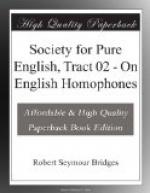[Footnote 26: Phonetic Transcriptions of English, by D. Jones, 1907, Introd., p. v, ’The peculiarities of Style A as compared with Style B are especially marked. These differences are partly natural, i.e. modifications produced involuntarily as the result of speaking more slowly or of endeavouring to speak more distinctly, and partly artificial, i.e. modifications due to the well-established though perhaps somewhat arbitrary rules laid down by teachers of elocution,’ &c., and Mr. Jones is quite right in complaining that his pupils make fools of themselves when they try to speak slower.]
I believe that there has never been in Europe a fluent script so beautiful and legible as that of our very best English writers of to-day. But their aesthetic mastery has come from loving study of the forms that conscious artistry had perfected, and through a constant practice in their harmonious adaptation.
Finally, it may be worth while to raise the question how it can be that a man of Mr. Jones’ extreme competence in his science should commit himself to a position that appears so false and mischievous.
[Sidenote: Reason of present discredit of phonetics.]
The unpopularity of phonetics is not wholly undeserved: from its early elements, the comfortably broad distinctions of convincing importance, it has progressed to a stage of almost infinite differentiations and subtleties; and when machinery was called in to dispose of controversy, a new and unsuspected mass of baffling detail was revealed.
The subject cannot be treated parenthetically, nor am I capable of summarizing it; but it seems clear that the complexity of the science has driven off public sympathy and dashed the confidence of scholars, withdrawing thereby some of the wholesome checks that common sense might else have imposed on its practical exponents. The experts thus left to themselves in despair of any satisfactory solution, are likely enough to adopt the simplifications most agreeable to their present ideas, and measure the utility of such simplifications by the accidental conveniences of their own science, independently of other considerations.
[Sidenote: The practical difficulty.]
The main practical difficulty which they have to meet in providing a reasonably satisfactory phonetic script or type for the English language is this, that the symbols of their alphabet must not greatly exceed in number those of the literary alphabet, whereas the sounds that they have to indicate do greatly exceed.




